2018-2019年人教版英语七年级上册Unit6词汇点睛
人教版七年级英语上册Unit 6单词表最新版

人教版七年级英语上册Unit 6单词表(最新版)人教版七年级英语上册Unit 6单词表(最新版)Unit 6banana /b?'na:n?/ n. 香蕉hamburger /'h?mb?:g?/ n. 汉堡包tomato /t?'ma:t?u/ n. 西红柿ice-cream /ais'kri:m/ n. 冰激凌salad /'s?l?d/ n. 沙拉strawberry /'str?:b?ri/ n. 草莓pear /pe?/ n. 梨milk /milk/ n. 牛奶bread /bred/ n. 面包birthday /'b?:θdai/ n. 生日dinner /'din?/ n. (中午或晚上吃的)正餐week /wi:k/ n. 周;星期think about 思考;思索food /fu:d/ n. 食物sure /?u?/ adv. 当然;肯定;一定How about...? (提出建议)......怎么样?burger /'b?:g?/ n. (=hamburger)汉堡包vegetable /'ved?t?bl/ n. 蔬菜fruit /fru:t/ n. 水果right /rait/ adj. 正确的;适当的apple /'?pl/ n. 苹果then /?en/ adv. 那么egg /eg/ n. 蛋;鸡蛋carrot /'k?r?t/ n. 胡萝卜rice /rais/ n. 大米;米饭chicken /'t?ikin/ n. 鸡肉so /s?u/ conj. (引出评论或问题)那么breakfast /'brekf?st/ n. 早餐;早饭lunch /l?nt?/ n. 午餐star /sta:/ n. 明星;星星eat /i:t/ v. 吃well /wel/ adv. 好;令人满意地habit /'h?bit/ n. 习惯healthy /'helθi/ adj. 健康的really /'ri:?li/ adv. 真正地question /'kwest??n/ n. 问题want /w?nt/ v. 需要;想要be /bi:/ v. 变成fat /f?t/ adj. 肥的;肥胖的。
人教版七年级上册英语 Unit 6 知识点总结
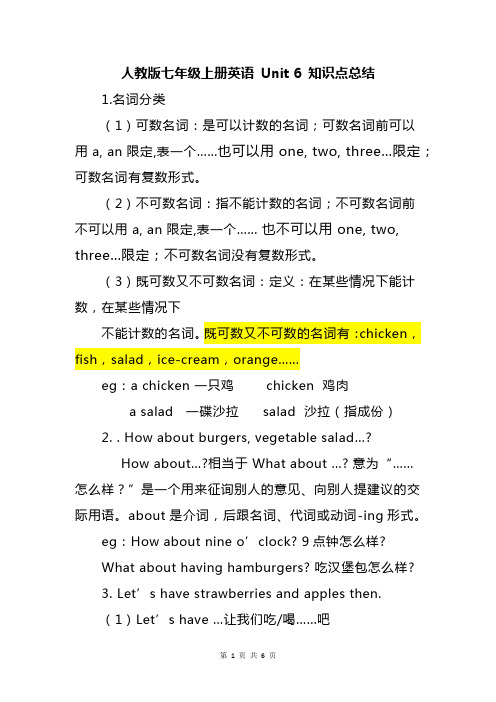
人教版七年级上册英语Unit 6 知识点总结1.名词分类(1)可数名词:是可以计数的名词;可数名词前可以用 a, an 限定,表一个…...也可以用 one, two, three…限定;可数名词有复数形式。
(2)不可数名词:指不能计数的名词;不可数名词前不可以用 a, an 限定,表一个…...也不可以用 one, two, three…限定;不可数名词没有复数形式。
(3)既可数又不可数名词:定义:在某些情况下能计数,在某些情况下不能计数的名词。
既可数又不可数的名词有:chicken,fish,salad,ice-cream,orange……eg:a chicken 一只鸡chicken 鸡肉a salad 一碟沙拉salad 沙拉(指成份)2. . How about burgers, vegetable salad…?How about…?相当于 What about …? 意为“……怎么样?”是一个用来征询别人的意见、向别人提建议的交际用语。
about是介词,后跟名词、代词或动词-ing形式。
eg:How about nine o’clock? 9点钟怎么样?What about having hamburgers? 吃汉堡包怎么样?3.Let’s have strawberries and apples then.(1)Let’s have …让我们吃/喝……吧——let sb. do sth.让某人做某事;let sb. not do sth.让某人不做某事(2)have是多义词,归纳如下:1) 有,拥有; I have a new watch.2) 吃,喝; Let’s have some milk and some bread.3) 构成固定短语: have a look 看一看4. Let’s think about the food.(1)think about 思考,思索(一般是短时间的较仔细的考虑)e.g. :What do you think about that?你认为怎么样?I’ll have to think about it. 我得想一想。
人教版七年级英语上册Unit6 单词 知识梳理 词汇句式精讲

人教版七年级英语上册Unit6单词知识梳理词汇句式精讲Unit6 单词banana /bə'nɑ:nə/香蕉hamburger /'hæmbɜ:(r)ɡə(r)/汉堡包tomato /tə'mɑ:təʊ/西红柿ice-cream /,aɪs'kri:m/冰激凌salad /'sæləd/沙拉strawberry /'strɔ:berɪ/草莓pear /peə(r)/梨milk /mɪlk/牛奶bread /bred/面包birthday /'bɜ:(r)θdeɪ/生日dinner /'dɪnə(r)/(中午或晚上吃的)正餐week /wi:k/周;星期think about思考;思索food /fu:d/食物sure /ʃʊə(r)/当然;肯定;一定How about...?(提出建议)...怎么样?burger /'bɜ:(r)ɡə(r)/汉堡包= hamburgervegetable/'veʤtəbəl/蔬菜fruit /fru:t/水果right /raɪt/正确的;适当的apple /'æpl/苹果then /ðen/那么egg /eɡ/蛋;鸡蛋carrot /'kærət/胡萝卜rice /raɪs/大米;米饭chicken /'ʧɪkɪn/肌肉so /səʊ/ (引出评论或问题)那么breakfast /'brekfəst/早餐;早饭lunch /lʌnʧ/午餐star /stɑ:(r)/明星;星星eat /i:t/吃well /wel/好;令人满意的habit /'hæbɪt/习惯healthy /'helθi/健康的really/'ri:əli/真正地question /'kwesʧən/问题want /wɒnt/需要;想要be /bi:/变成fat /fæt/肥的;肥胖的02Unit6 知识梳理Unit6 Do you like bananas?【重点短语】1. John ’s birthday dinner 约翰的生日宴会2. vegetable salad 蔬菜沙拉3. two tomatoes 两个西红柿4. eat well 吃得营养5. think about 考虑6. eat/havebreakfast/lunch/dinner 吃早/午/晚饭7. sports stars 体育明星8. the volleyball star 排球明星9. ask sb. about sth. 问某人某事10. like hamburgers/ice-cream 喜欢汉堡包/冰淇淋11. like eating eggs 喜欢吃鸡蛋12. her eating habits 她的饮食习惯13. be (not) healthy (不)健康14. one last question 最后一个问题15. healthy food 健康食物16. after breakfast/lunch/dinner 早/午/晚饭后【重点句型】1.—Do you like salad? 你喜欢沙拉吗?一Yes,I do. /No, I don’t. 是的,我喜欢。
人教版七年级英语上册 Unit 6 知识归纳(含答案)
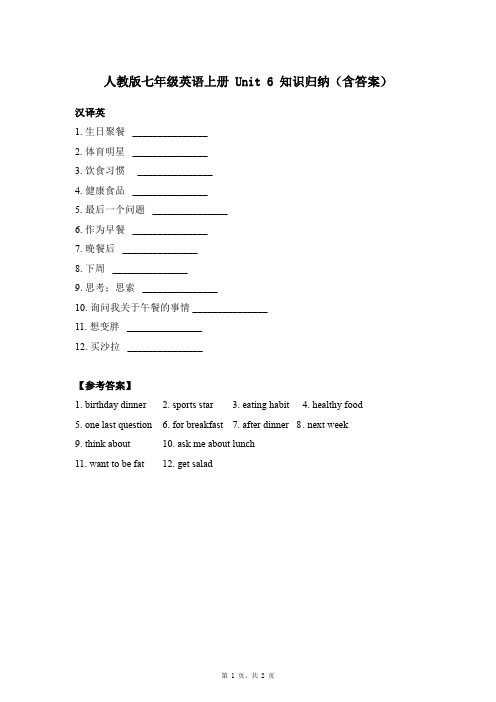
人教版七年级英语上册 Unit 6 知识归纳(含答案)汉译英1.生日聚餐_______________2.体育明星_______________3.饮食习惯_______________4.健康食品_______________5.最后一个问题_______________6.作为早餐_______________7.晚餐后_______________8.下周_______________9.思考;思索_______________10.询问我关于午餐的事情_______________11.想变胖_______________12.买沙拉_______________【参考答案】1. birthday dinner2. sports star3. eating habit4. healthy food5. one last question6. for breakfast7. after dinner8. next week9. think about10. ask me about lunch11. want to be fat12. get salad汉译英1. Cindy认为她妹妹喜欢冰激凌。
____________________________________ 2.那么咱们喝牛奶吧!____________________________________ 3. Jack喜欢什么蔬菜?____________________________________ 4.——咱们早饭吃什么?——水果沙拉怎么样?____________________________________ ____________________________________ 5.——Tom喜欢梨吗?——不,他不喜欢。
____________________________________ ____________________________________ 6.——你们午饭后吃草莓吗?——是的,我们吃。
英语七年级上人教版知识点大全Unit 6

语法:名词的分类名词n、表示人或事物的名称。
分为:专有名词与普通名词、1)专有名词:个别的人,事物,地点等专有的名称。
如:人名、地名、商标名等。
专有名词的首字母要大写。
2)普通名词:又分为可数名词,不可数名词,既可数又不可数的名词。
可数名词:能以数目来计算(能够分成个体)、特征:可数名词有单数形式与复数形式,少数可数名词的复数形式是不规则变化(如:man-men,sheep—sheep)。
不可数名词:不能以数目来计算(不能够分成个体)。
特征:一般没有复数形式、既可数又不可数的名词:(如water, ice—cream等)详情见后文分析、语法:可数名词的分类可数名词分为“个体名词”(表示某类人或事物中的个体,如worker, farmer, desk, factory等)和“集体名词/集合名词”(表示作为一个整体来看的一群人或一些事物,如people, family 等)。
语法:不可数名词的分类不可数名词分为“物质名词”(表示无法分为个体的物质,如meat, rice, water, milk, orange(橙汁) 等)和“抽象名词”(表示动作、状态、情况、品质等抽象概念,如love, work, time, health, friendship等)。
补充:关于可数名词前的常见修饰语1)可数名词单数表示泛指时,前面要用不定冠词a/an,表示特指时,前面要用定冠词the;2)可数名词前可用具体的数词来表示具体的数量、不可数名词前不行、e。
g、one apple, twoapples。
3)现时期只能修饰可数名词的有:many, a few, few, these, those。
3)现时期既能够修饰可数又能够修饰不可数的有: this, that,some, any, a lot of, lots of, all 等。
语法:可数名词单复数的变化规则一、规则变化1)一般情况下,直截了当在名词词尾加-s。
期末复习人教版七年级上Unit6重点词汇及练习含答案
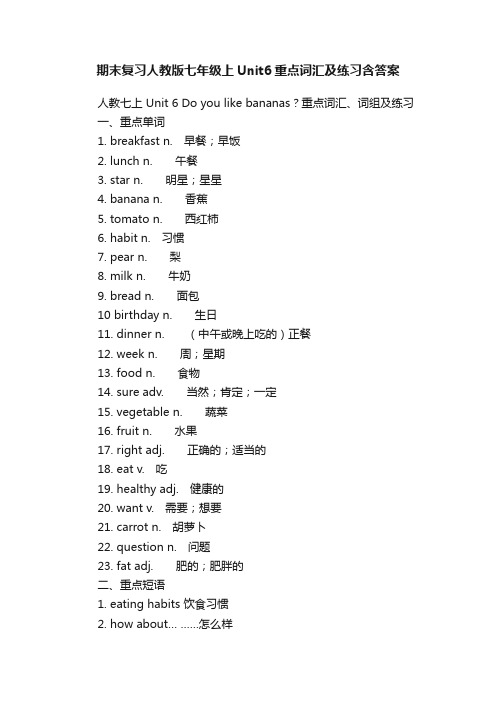
期末复习人教版七年级上Unit6重点词汇及练习含答案人教七上 Unit 6 Do you like bananas?重点词汇、词组及练习一、重点单词1. breakfast n. 早餐;早饭2. lunch n. 午餐3. star n. 明星;星星4. banana n. 香蕉5. tomato n. 西红柿6. habit n. 习惯7. pear n. 梨8. milk n. 牛奶9. bread n. 面包10 birthday n. 生日11. dinner n. (中午或晚上吃的)正餐12. week n. 周;星期13. food n. 食物14. sure adv. 当然;肯定;一定15. vegetable n. 蔬菜16. fruit n. 水果17. right adj. 正确的;适当的18. eat v. 吃19. healthy adj. 健康的20. want v. 需要;想要21. carrot n. 胡萝卜22. question n. 问题23. fat adj. 肥的;肥胖的二、重点短语1. eating habits 饮食习惯2. how about… ……怎么样3. think about 思考4. next week 下周5. a volleyball star一位排球明星6. ask sb. about sth. 问某人关于某事7. healthy food 健康的食品8. want to do sth. 想要做某事9. after dinner 晚饭后三、重点句型1. —Do you like bananas?'你喜欢(吃)香蕉吗?'—Yes, I do.'是的,我喜欢。
'2. John's birthday dinner is next week. 约翰的生日宴会在下周。
3. Let's think about the food. 让我们想想吃的东西吧。
人教版初中英语新教材七年级上Unit6知识点归纳总结(复习必背)

Unit 6 A Day in the Life !学习目标单元主题人与自我→做人与做事→自我认识,自我管理,自我提升必备单词Section A1.quarter / kwɔ:tə(r)/ n.一刻钟;四等份之一2.shower/’ʃaʊə(r)/ n.淋浴;淋浴器v.洗淋浴3.brush/brʌʃ/v.(用刷子)刷n.刷子;画笔4.tooth /tu:θ/ n.牙齿5.duty/'dju:ti/n.值班;职责6.usually/'ju:ʒuəli/adv.通常地;一般地7. reporter/rɪ'pɔ:tə(r)/n..记者8. around /ə'raʊnd/ prep.& adv·大约;环绕;到处9.homework/'haʊmwɜ:k/n.家庭作业10.saying/'seɪɪŋ/n.谚语;格言11.rise/raɪz/v.起床;升起;增长n.增加;增强12.stay/steɪ/v.停留;待13.routine/ru:'ti:n/n.常规14.restaurant/'restrɒnt/n.餐馆;餐厅15.housework/'haʊswɜ:k/n.家务劳动16.while/waɪl/n.一段时间;一会儿conj.在······期间;当······的时候17.weekend/,wi:k'end/n.周末Section B1.daily/'deɪli/adj.每日的;日常的2.only/'əʊnli/adv.只;仅3.break/breɪk/n.休息;间断v.(使)破碎;损坏4. Finnish/ 'fɪnɪʃ/ / n ..芬兰语adj.芬兰的;芬兰人的;芬兰语的5.finish/'fɪnɪʃ/v.结束;完成6.hockey/'hɒki/n.曲棍球7.already/ɔ:l'redi/adv.已经;早已8.dark/da:k/adj.昏暗的;深色的9.outside/,aʊt'saɪd/adv.在外面adj.外面的prep.在······外面10.part/pa:t/n.部分11.everyday/'evrideɪ/adj.每天的;日常的12.prepare/prɪ'peə(r)/v.把······预备好;准备13.Finland/'fɪnlənd/芬兰高频短语1.make use of 使用···;利用···· 10.have class 上课2.take a shower 淋浴11.for a while 一会儿3.get dressed 穿衣服12.at weekends 在周末4.brush teeth 刷牙13.daily routine 日常生活5.on duty 值班14.home economics 家事经济6.get up 起床;站起15.ice hockey 冰球运动;冰上曲棍球7.do one's homework 做···的家庭作业16.prepare sth for为······把某物准备好8.go to bed 上床睡觉17.get off work 下班9.play sport 做运动18.another four hours 另外四小时常考句型1.what time 提问具体时间(钟点):-What time do you usually get up?你通常几点起床?-I usually get up at 6:30 a.m.我通常早上六点半起床。
人教版七年级上册Unit6词组及句子

Unit6词组及句子词组:1考虑做某事think about doing sth2. 询问某人关于某事ask sb about sth .3. 想要某物want sth4想做某事want to do sth;5. “想要成为…;想要变得…”want to be… “6. eat well 吃得好7. 某人的生日晚宴sb’s birthday dinner8. next week 下周9. 一些水果/食物some fruit/food10.一些水果/食物eating habits11. 就早/午/晚餐而言for breakfast/lunch/dinner12. 最后一个问题one last question13吃草莓和苹果eat strawberries and apples14..一个苹果和一个鸡蛋an apple and an egg15..一些胡萝卜和鸡肉some carrots and chicken16.一些沙拉some salad17.一些西红柿some tomatoes18.. 水果和蔬菜fruit and vegetables19. 喜欢冰淇淋like ice cream20.. 喜欢吃香蕉like eating bananas21. John的生日宴会John’s birthday party22. 蔬菜沙拉vegetable salad 水果沙拉fruit salad23. 这位排球明星the volleyball star24.早餐吃汉堡和水果eat hamburgers and fruit25.吃一些健康食品eat some healthy food26. 想变胖want to be fat27. 吃早/中/晚餐have breakfast/lunch/dinner28踢足球踢得好play soccer well29.什么水果/食品what fruit/food句子:1你喜欢沙拉吗?是,我喜欢。
人教版英语七年级上册 Unit 6 知识点梳理
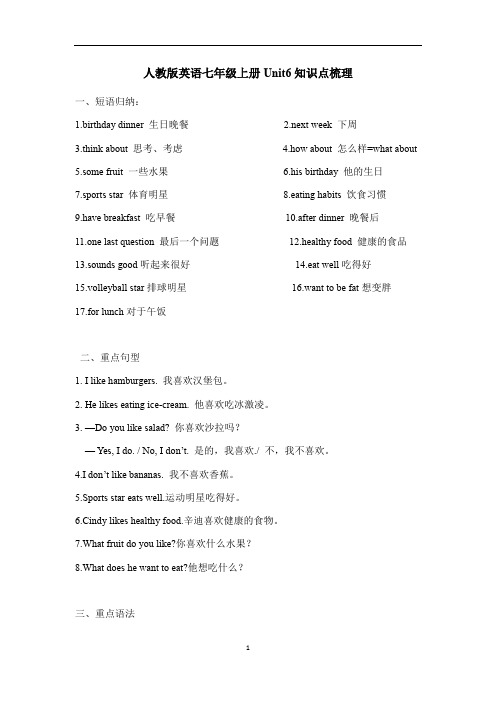
人教版英语七年级上册Unit6知识点梳理一、短语归纳:1.birthday dinner 生日晚餐2.next week 下周3.think about 思考、考虑4.how about 怎么样=what about5.some fruit 一些水果6.his birthday 他的生日7.sports star 体育明星8.eating habits 饮食习惯9.have breakfast 吃早餐10.after dinner 晚餐后11.one last question 最后一个问题12.healthy food 健康的食品13.sounds good听起来很好14.eat well吃得好15.volleyball star排球明星16.want to be fat想变胖17.for lunch对于午饭二、重点句型1. I like hamburgers. 我喜欢汉堡包。
2. He likes eating ice-cream. 他喜欢吃冰激凌。
3. —Do you like salad? 你喜欢沙拉吗?— Yes, I do. / No, I don’t. 是的,我喜欢./ 不,我不喜欢。
4.I don’t like bananas. 我不喜欢香蕉。
5.Sports star eats well.运动明星吃得好。
6.Cindy likes healthy food.辛迪喜欢健康的食物。
7.What fruit do you like?你喜欢什么水果?8.What does he want to eat?他想吃什么?三、重点语法1.可数名词:banana-bananas hamburger-hamburgers tomato-tomatoesstrawberry-strawberries pear-pears vegetable-vegetablesapple-apples egg-eggs carrot-carrots不可数名词:ice-cream salad milk bread food rice chicken(鸡肉)名词复数变化规则:(1)一般在词尾加-s。
人教版(2024)英语七年级上册Unit6词汇知识点课件

• We go skiing most weekends in winter.
• 我们在冬天的周末大多去滑雪
daily adj.每日的,日常的
daily life 日常生活
Her daily life involved meeting lots of people. 她在日常生活中要接触很多人。
only adv.只,仅
• The bar is for members only . • 这间酒吧只对会员开放 • It only took a few seconds. • 那只需要几秒钟
not only``````but also 不但·····而且
break
Let's take a break . n.休息
routine n.常规
daily routine 日常生活;日常工作
Make exercise a part of
your daily routine . 让锻炼成为你日常生活的 一部分
restaurant n.餐馆,餐厅
chinese restaurant 中餐厅;中餐馆
We had a meal in a restaurant. 我们在餐厅吃了顿饭
housework
saying n.谚语,格
言
正如谚语所说
‘Accidents will happen’, as the saying goes .
常言道:“意外事,总难免。”
rise v.升起,增强
• I'm going to ask for a rise. n.增加,升起 • 我打算要求加薪 • Smoke was rising from the chimney.
Unit6知识归纳人教版英语七年级上册(2)
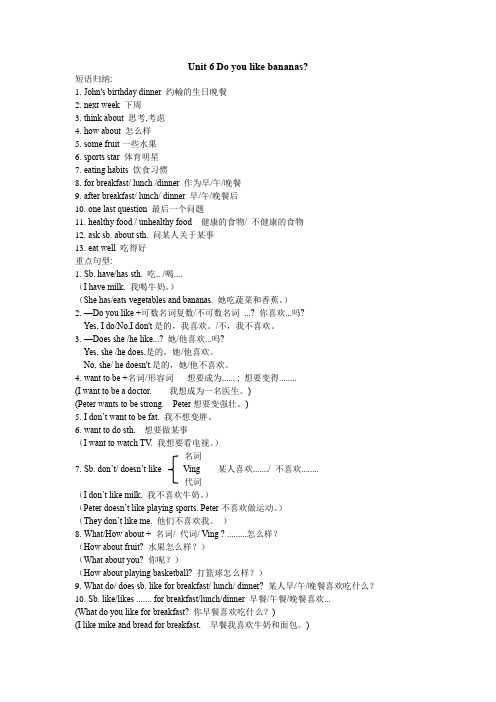
Unit 6 Do you like bananas?短语归纳:1.John's birthday dinner 约輸的生日晚餐2.next week 下周3.think about 思考,考虑4.how about 怎么样5.some fruit一些水果6.sport s star 体育明星7.eating habits 饮食习惯8.for breakfast/ lunch /dinner 作为早/午/晚餐9.after breakfast/ lunch/ dinner 早/午/晚餐后10.one last question 最后一个问题11.healthy food / unhealthy food 健康的食物/ 不健康的食物12.ask sb. about sth. 问某人关于某事13.eat well 吃得好重点句型:1.Sb. have/has sth. 吃.. /喝....(I have milk. 我喝牛奶。
)(She has/eats vegetables and bananas. 她吃蔬菜和香蕉。
)2.—Do you like +可数名词复数/不可数名词...? 你喜欢...吗?Yes, I do/No,I don't是的,我喜欢。
/不,我不喜欢。
3.—Does she /he like...? 她/他喜欢...吗?Yes, she /he does.是的,她/他喜欢。
No, she/ he doesn't.是的,她/他不喜欢。
4.want to be +名词/形容词想要成为...... ; 想要变得........(I want to be a doctor. 我想成为一名医生。
)(Peter wants to be strong. Peter想要变强壮。
)5.I don’t want to be fat. 我不想变胖。
6.want to do sth. 想要做某事(I want to watch TV. 我想要看电视。
人教版七年级(初中一年级)上册英语第六单元必背课文、单词与语法梳理汇总

七年级上册英语第六单元必背课文、单词与语法梳理一、必背课文Section A - 1bConversation 1:A: Do you like bananas?B: Yes, I do.Conversation 2:A: Do you like hamburgers?B: No, I don't. I like chicken.Section A - 2dJack: Hey, John's birthday dinner is next week. Let's think about the food.Tom: Sure. How about burgers, vegetable salad, and some fruit?Jack: Well, John likes hamburgers, but I don't think he likes salad.Tom: OK. What about some fruit?Jack: John likes strawberries and apples.Tom: OK. Let's have strawberries and apples then.Section B - 2bCindy Smith has a healthy eating habit. She loves fruit. For breakfast, she always has an apple, some bread and milk. She likes bananas, but she doesn't like oranges. For lunch, she has chicken, rice and vegetables. She really likes salad. For dinner, she usually has some beef, tomatoes and noodles. She doesn't like ice - cream becauseshe doesn't want to be fat.二、重点单词1. banana:[bəˈnɑːnə] n. 香蕉2. hamburger:[ˈhæmbɜːɡə(r)] n. 汉堡包3. tomato:[təˈmɑːtəʊ] n. 番茄;西红柿(复数形式tomatoes)4. ice - cream:[ˈaɪs kriːm] n. 冰淇淋5. salad:[ˈsæləd] n. 沙拉(尤指莴苣或生菜)6. strawberry:[ˈstrɔːbəri] n. 草莓(复数形式strawberries)7. pear:[peə(r)] n. 梨8. milk:[mɪlk] n. 牛奶;v. 挤奶9. bread:[bred] n. 面包10. birthday:[ˈbɜːθdeɪ] n. 生日11. dinner:[ˈdɪnə(r)] n. 正餐;晚餐12. week:[wiːk] n. 周;星期13. think about:思考;思索14. food:[fuːd] n. 食物15. sure:[ʃʊə(r)] adv. 当然;肯定;adj. 确信的;可靠的16. how about...?:(提出建议)……怎么样?17. burger:[ˈbɜːɡə(r)] n.(= hamburger)汉堡包18. vegetable:[ˈvedʒtəbl] n. 蔬菜;植物;adj. 蔬菜的;植物的19. fruit:[fruːt] n. 水果;果实;v. 结果实20. right:[raɪt] adj. 正确的;适当的;右边的;adv. 正确地;直接地;向右;n. 权利;右边21. apple:[ˈæpl] n. 苹果22. then:[ðen] adv. 那么;然后;当时;此外23. egg:[eɡ] n. 蛋;鸡蛋24. carrot:[ˈkærət] n. 胡萝卜25. rice:[raɪs] n. 稻米;米饭26. chicken:[ˈtʃɪkɪn] n. 鸡;鸡肉27. so:[səʊ] conj. 所以;因此;adv. (表示程度)这么;那么;如此地28. breakfast:[ˈbrekfəst] n. 早餐;早饭29. lunch:[ˈlʌntʃ] n. 午餐;午饭30. healthy:[ˈhelθi] adj. 健康的;健壮的;有益于健康的31. really:[ˈriːəli] adv. 真正地;确实;(表示强调)的确32. question:[ˈkwestʃən] n. 问题;疑问;v. 询问;怀疑33. want:[wɒnt] v. 要;想要;需要;n. 需要的东西;缺少的东西34. be:[biː] v. 是(am、is、are等的原形);有;存在35. fat:[fæt] adj. 肥的;肥胖的;厚的;大量的;n. 脂肪;肥肉三、语法知识点1. 一般现在时(like的用法)-like表示“喜欢”的用法:like在一般现在时中,当主语是第一、二人称(I、you、we、you、they)以及复数名词时,用原形like,如:I like apples.(我喜欢苹果。
初一上册英语u6重点单词词组

初一上册英语u6重点单词词组1. animal – noun- Definition: a living organism that feeds on organic matter, typically having specialized sense organs and able to respond rapidly to stimuli.- Example sentence: I love going to the zoo to see all the different animals.2. mammal – noun- Definition: a warm-blooded vertebrate animal of a class that is distinguished by the possession of hair or fur and females that secrete milk for the nourishment of the young.- Example sentence: A dog is an example of a mammal.3. reptile – noun- Definition: a cold-blooded vertebrate animal of a class that includes snakes, lizards, crocodiles, turtles, and tortoises.- Example sentence: The snake is a very common reptile found in many parts of the world.4. bird – noun- Definition: a warm-blooded egg-laying vertebrate animal distinguished by the possession of feathers, wings, and a beak.- Example sentence: The eagle is a majestic bird.5. fish – noun- Definition: a limbless cold-blooded vertebrate animal with gills and fins and living wholly in water.- Example sentence: Many people enjoy fishing as a hobby.6. insect – noun- Definition: a small arthropod animal that has six legs and generally one or two pairs of wings.- Example sentence: Butterflies are beautiful insects.7. pet – noun- Definition: a domesticated animal kept for companionship or amusement.- Example sentence: My sister has a pet cat named Whiskers.8. wild – adjective- Definition: living in a state of nature; not tamed or domesticated.- Example sentence: We saw a wild deer while hiking in the forest.9. tame – adjective- Definition: (of an animal) not dangerous or frightened of people; domesticated.- Example sentence: The circus lion is very tame and can perform tricks.10. domestic – adjective- Definition: relating to the running of a home or to family relations.- Example sentence: Dogs and cats are common domestic animals.11. zoo – noun- Definition: an establishment that maintains a collection of wild animals, typically in a park or gardens, for study, conservation, or displayto the public.- Example sentence: Let's visit the zoo this weekend and see the elephants.12. jungle – noun- Definition: an area of land overgrown with dense forest and tangled vegetation.- Example sentence: Many exotic animals live in the jungle.13. forest – noun- Definition: a large area covered chiefly with trees and undergrowth.- Example sentence: We went camping in the forest last summer.14. desert – noun- Definition: a dry, barren area of land, especially one covered with sand, that is characterized by extreme temperatures and sparse rainfall.- Example sentence: Camels are well-suited to survive in the desert.15. ocean – noun- Definition: a very large expanse of sea, in particular each of the main areas into which the sea is divided geographically.- Example sentence: Whales are magnificent creatures found in the ocean.16. sea – noun- Definition: the expanse of salt water that covers most of theearth's surface and surrounds its land masses.- Example sentence: Seashells can often be found on the beach.17. forest – noun- Definition: a large area covered chiefly with trees and undergrowth.- Example sentence: We went camping in the forest last summer.18. polar bear – noun- Definition: a large white bear native to the Arctic.- Example sentence: Polar bears are well adapted to live in cold climates.19. panda – noun- Definition: a large bearlike mammal with characteristic black and white markings, native to certain mountain forests in China. It feeds almost entirely on bamboo.- Example sentence: Pandas are an endangered species.20. lion – noun- Definition: a large tawny-colored cat that lives in prides, found in Africa and northwestern India.- Example sentence: The lion is often referred to as the "king of the jungle".21. tiger – noun- Definition: a large solitary cat that has a yellowish-brown coat with black stripes, native to the forests of Asia but becoming increasingly rare.- Example sentence: Tigers are powerful hunters.22. monkey – noun- Definition: a small to medium-sized primate that typically has a long tail, most kinds of which live in trees in tropical countries.- Example sentence: Monkeys are known for their playful behavior.23. giraffe – noun- Definition: a very tall African mammal with a very long neck and forelegs, having a coat patterned with brown patches separated by lighter lines.- Example sentence: The giraffe is the tallest animal in the world.24. elephant – noun- Definition: a very large plant-eating mammal with a prehensile trunk, long curved ivory tusks, and large ears, native to Africa and southern Asia.- Example sentence: Elephants are highly intelligent animals.25. snake – noun- Definition: a long limbless reptile that has no eyelids, a short tail, and jaws that are capable of considerable extension.- Example sentence: Snakes can swallow prey much larger than their own heads.26. lizard – noun- Definition: a small or medium-sized reptile that typically has along body and tail, four legs, and often lives in hot, dry places.- Example sentence: Lizards can regrow their tails if they lose them.27. crocodile – noun- Definition: a large semiaquatic reptile with a long snout, thick skin, and powerful jaws, living in tropical rivers and estuaries.- Example sentence: Crocodiles are dangerous animals, so it'simportant to keep your distance.28. turtle – noun- Definition: a reptile with a horny shell of its own, especially one that lives in the sea.- Example sentence: Sea turtles lay their eggs on the beach at night.29. tortoise – noun- Definition: a land-dwelling reptile with a shell, native to hot, dry regions of the Old World.- Example sentence: The tortoise is known for its slow movement and long life span.30. eagle – noun- Definition: a large bird of prey with a powerful build, a large hooked beak, and keen eyesight.- Example sentence: Eagles have strong wings that allow them to soar high in the sky.31. parrot – noun- Definition: a bird with a strong beak and usually bright plumage, known for its ability to mimic speech.- Example sentence: Parrots can learn to repeat words and phrases.32. penguin – noun- Definition: a flightless aquatic bird with webbed feet and wings modified for swimming, found chiefly in the Southern Hemisphere.- Example sentence: Penguins are able to survive in extremely cold temperatures.33. fish – noun- Definition: a cold-blooded vertebrate animal with gills and fins, living exclusively in water.- Example sentence: There are many different species of fish in the ocean.34. shark – noun- Definition: a large predatory fish with a cartilaginous skeleton and a streamlined body, living mainly in the sea.- Example sentence: Sharks have a reputation for being fearsome predators.35. dolphin – noun- Definition: a highly intelligent marine mammal with a streamlined body and a horizontal tail fin, known for its playful behavior and clicks.- Example sentence: Dolphins are known to be very sociable and intelligent creatures.36. whale – noun- Definition: a very large marine mammal with a streamlined body, a horizontal tail fin, and breathe through blowhole(s) on top of the head.- Example sentence: Whales are the largest animals on Earth.37. insect – noun- Definition: a small arthropod animal with six legs, a body divided into three parts, and usually wings.- Example sentence: Insects can have a significant impact on ecosystems.38. butterfly – noun- Definition: a colorful insect with two pairs of large wings and a fluttering flight.- Example sentence: Butterflies undergo a remarkable transformation from caterpillars.39. spider – noun- Definition: an arachnid with eight legs, two body segments, and spinnerets that produce silk.- Example sentence: Spiders use their silk to create intricate webs.40. pet – noun- Definition: an animal kept as a companion and often treated with great care and affection.- Example sentence: Having a pet can bring joy and companionship into your life.41. wildlife – noun- Definition: animals that live in the wild, especially those that are undomesticated.- Example sentence: Wildlife conservation is crucial for maintaining biodiversity.42. habitat – noun- Definition: the natural environment or home of an animal or plant.- Example sentence: Loss of habitat is a significant threat to many species.43. ecosystem – noun- Definition: a community of living organisms and the nonliving components of their environment, interacting as a system.- Example sentence: Coral reefs are examples of diverse ecosystems. 44. conservation – noun- Definition: the preservation, protection, or restoration of the natural environment and of wildlife.- Example sentence: Conservation efforts are essential for thesurvival of endangered species.45. extinction – noun- Definition: the process of a species, family, or larger group dying out or the state of having died out.- Example sentence: Many species are at risk of extinction due to human activities.46. migration – noun- Definition: the seasonal movement of animals from one region to another.- Example sentence: Birds migrate to escape harsh weather conditions.。
人教版初一上册英语第六单元unit 6词汇篇

Unit6 词汇篇1. birthday n. 生日。
When is your birthday?你的生日什么时候?相关短语:birthday dinner 生日晚宴birthday party 生日聚会birthday cake 生日蛋糕2. think about意为“思考;考虑”,think为不及物动词,常与介词about连用,其后可接名词、代词或v.-ing形式.3. sure adv。
当然;肯定;一定,其同义词为certainly。
4. right adj. 正确的;适当的,在句中作表语或定语。
Is he right? 他是对的吗?It's a right answer. 这是个正确的答案.5。
so conj. 那么。
So,let’s go to dance。
那么,让我们去跳舞吧。
拓展:conj. 因此,所以。
I’m ill today,so I can't go to school. 今天我病了,所以我不能去上学了。
6. star n。
明星。
There are many stars in the sky. 天空中有许多星星。
7。
eat v. 吃。
8. well adv。
“好”。
You speak English very well. 你英语说得很好。
词义辨析:good/well。
good形容词;well副词,但指身体状况是形容词.She will make a very good athlete。
她将来会成为一名很好的运动员.He is well now。
他现在康复了。
9。
healthy adj. 健康的,可放在名词之前作定语,也可放在连系动词之后作表语。
Don’t eat bad fru it,it's not healthy。
别吃坏了的水果,不健康.相关名词:health n. 健康。
Smoking is bad for your health。
吸烟有害健康.10. really adv。
人教版初一上册英语第六单元unit6词汇篇

Unit6词汇篇1.birthday n.生日。
When is your birthday?你的生日什么时候?相关短语:birthday dinner生日晚宴birthday party生日聚会birthday cake 生日蛋糕2. think about意为“思考;考虑”,think为不及物动词,常与介词about 连用,其后可接名词、代词或 v.-ing 形式。
3. sure adv. 当然;肯定;一定,其同义词为certainly 。
4.right adj.正确的;适当的,在句中作表语或定语。
Is he right? 他是对的吗?It's a right answer. 这是个正确的答案。
5.so conj.那么。
So, let's go to dance.那么,让我们去跳舞吧。
拓展: conj. 因此,所以。
I ’ m ill today, so I can’ t go今to天school我病了.,所以我不能去上学了。
6. star n. 明星。
There are many stars in the sky.天空中有许多星星。
7.eat v.吃。
8.well adv.好“”。
You speak English very well.你英语说得很好。
词义辨析: good/well 。
good 形容词; well 副词,但指身体状况是形容词。
She will make a very good athlete.她将来会成为一名很好的运动员。
He is well now.他现在康复了。
9.healthy adj.健康的,可放在名词之前作定语,也可放在连系动词之后作表语。
Don't eat bad fruit, it's not healthy.别吃坏了的水果,不健康。
相关名词:health n. 健康。
Smoking is bad for your health.吸烟有害健康。
- 1、下载文档前请自行甄别文档内容的完整性,平台不提供额外的编辑、内容补充、找答案等附加服务。
- 2、"仅部分预览"的文档,不可在线预览部分如存在完整性等问题,可反馈申请退款(可完整预览的文档不适用该条件!)。
- 3、如文档侵犯您的权益,请联系客服反馈,我们会尽快为您处理(人工客服工作时间:9:00-18:30)。
Unit6
香蕉
汉堡包
西红柿
冰激凌
沙拉
草莓
梨
牛奶
面包
生日
(中午或晚上吃的)正餐周;星期
思考;思索
食物
当然;肯定;一定
(提出建议) 怎么样?汉堡包
蔬菜
水果
正确的;适当的苹果
那么
蛋;鸡蛋
胡萝卜
大米;米饭
鸡肉
(引出评论或问题)那么早餐;早饭
午餐
明星;星星
吃
好;令人满意地
习惯
健康的
真正地
问题
需要;想要
完成
肥的;肥胖的
1.名词的分类
1)名词分为“专有名词”和“普通名词”两大类。
专有名词是个别的人、事物、地点等专有的名称,如:Gina, China。
专有名词的第一个字母要大写。
2)普通名词又可分为下面四类:
①个体名词:表示某类人或东西中的个体。
如pen, student, apple。
②集体名词:表示若干个体组成的集合体。
如family, class。
③物质名词:表示无法分为个体的物质。
如water, broccoli等。
④抽象名词:表示动作、状态、品质、情感等。
如work, happiness 等。
个体名词和集体名词都是可数名词,物质名词和抽象名词都是不可数名词。
3)有些名词既可作可数名词又可作不可数名词,但意义不同,要注意区分。
①glass cn. 杯子 un. 玻璃 orange cn 橘子 un. 橘汁
②还有表示动物类的名词,表示动物时是可数名词,作为菜肴时是不可数名词。
chicken cn. 小鸡 un. 鸡肉 fish cn.鱼 un. 鱼肉
③salad, ice cream, food, fruit 作总称讲是不可数名词,作
种类讲是可数名词
She likes hamburgers, salad and apples.
a salad of tomato
2. good / well
1) good adj “好的”,常用来修饰名词。
a good student一位好学生
2)well ①adj “好的”,“健康的”(指身体好)He doesn’t feel well.他感觉不舒服。
②adv. “好”常用来修饰动词,放在动词之后。
He learns English well.他英语学得好。
